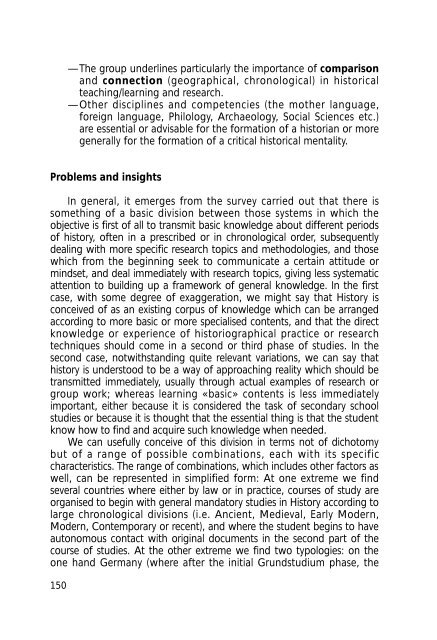Final Report Pilot Project - Relaciones Internacionales de la ...
Final Report Pilot Project - Relaciones Internacionales de la ...
Final Report Pilot Project - Relaciones Internacionales de la ...
You also want an ePaper? Increase the reach of your titles
YUMPU automatically turns print PDFs into web optimized ePapers that Google loves.
—The group un<strong>de</strong>rlines particu<strong>la</strong>rly the importance of comparison<br />
and connection (geographical, chronological) in historical<br />
teaching/learning and research.<br />
—Other disciplines and competencies (the mother <strong>la</strong>nguage,<br />
foreign <strong>la</strong>nguage, Philology, Archaeology, Social Sciences etc.)<br />
are essential or advisable for the formation of a historian or more<br />
generally for the formation of a critical historical mentality.<br />
Problems and insights<br />
In general, it emerges from the survey carried out that there is<br />
something of a basic division between those systems in which the<br />
objective is first of all to transmit basic knowledge about different periods<br />
of history, often in a prescribed or in chronological or<strong>de</strong>r, subsequently<br />
<strong>de</strong>aling with more specific research topics and methodologies, and those<br />
which from the beginning seek to communicate a certain attitu<strong>de</strong> or<br />
mindset, and <strong>de</strong>al immediately with research topics, giving less systematic<br />
attention to building up a framework of general knowledge. In the first<br />
case, with some <strong>de</strong>gree of exaggeration, we might say that History is<br />
conceived of as an existing corpus of knowledge which can be arranged<br />
according to more basic or more specialised contents, and that the direct<br />
knowledge or experience of historiographical practice or research<br />
techniques should come in a second or third phase of studies. In the<br />
second case, notwithstanding quite relevant variations, we can say that<br />
history is un<strong>de</strong>rstood to be a way of approaching reality which should be<br />
transmitted immediately, usually through actual examples of research or<br />
group work; whereas learning «basic» contents is less immediately<br />
important, either because it is consi<strong>de</strong>red the task of secondary school<br />
studies or because it is thought that the essential thing is that the stu<strong>de</strong>nt<br />
know how to find and acquire such knowledge when nee<strong>de</strong>d.<br />
We can usefully conceive of this division in terms not of dichotomy<br />
but of a range of possible combinations, each with its specific<br />
characteristics. The range of combinations, which inclu<strong>de</strong>s other factors as<br />
well, can be represented in simplified form: At one extreme we find<br />
several countries where either by <strong>la</strong>w or in practice, courses of study are<br />
organised to begin with general mandatory studies in History according to<br />
<strong>la</strong>rge chronological divisions (i.e. Ancient, Medieval, Early Mo<strong>de</strong>rn,<br />
Mo<strong>de</strong>rn, Contemporary or recent), and where the stu<strong>de</strong>nt begins to have<br />
autonomous contact with original documents in the second part of the<br />
course of studies. At the other extreme we find two typologies: on the<br />
one hand Germany (where after the initial Grundstudium phase, the<br />
150


